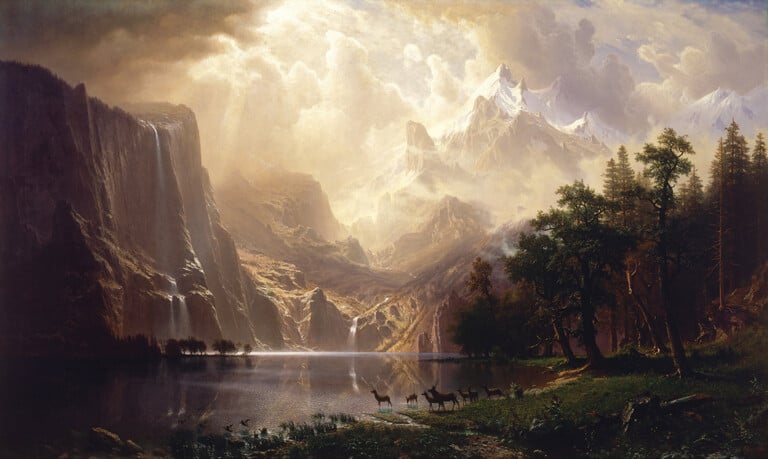Writing the territory: the literature of discovery and exploration
Started as a vision in Europe: it is a product of literary imagination. America existed only as a literary object that was represented in the writings of Europeans who first visited America. They brought back their visions, written in Spanish or French and not in English.
16th century: the English knew about America through outside texts, not from English texts.
The 1670s: English mariners started exploring the North American coast.
The creation of American literature goes hand in hand with the first permanent colonies at Jamestown, Plymouth, Boston, Charleston or Philadelphia.
In the language, American in temperament and tone, the literature of the colonists was different from the exotic narratives of the explorers (i.e. “land of miracles”, “eldorado”).
The literature of the colonists shows a contradictory mixture of terror and exaltation before the magnitude of the land.
However, more often than not, the literature of the first settlers shows that it was difficult to maintain a positive attitude toward America. George Percy’s Discourse on the Plantation (1607) shows that the writers saw America as a land of “meadows and goodly tall trees” and people as “miserable distressed”.
So they are full of ambivalence and contradictions. America is the land of new beginnings and opportunities but also a beautiful land of difficulties (sacrifices, isolation, and hard work). Ambivalence is an important factor in American literature.
This first contradictory experience will mark American literature with its most nasty and characteristic voice, created out of actions rather than imagery or contemplation.
The narratives of Captain Smith are big examples of the American new character: the narration of the internal life of the individuals goes hand in hand with the external description of the land.
There’s a constant dialogue between the mind of the individual and Nature. It’s always Nature that has a strong effect on the minds of individuals. Human minds only change with confrontations with Nature.
European literature was more based on contemplation whereas American literature was a concrete experience with Nature: which makes a huge philosophical difference. Captain Smith wrote:
- A true relation (1608)
- A map of Virginia (1612)
- The General Historie of Virginia, New England and the Summer Isles
The work of Capt. Smith is representative of a specific literary character in the sense that they show a deeply American theme: the theme of the relations between geographical exploration and individual exploration: by discovering the land, the individual also discovers himself. Self-exploration and geographical exploration came together.
With the change in the colonies and their social needs, there was also a change in writing. The writer’s role now consisted of more than observing and depicting the land.
At the end of the 17th century, American literature still showed the discovery of literature: same themes, same lyricism, poetic quality and sense of actions but despite this influence, a more abstract type of literature was now emerging.
For instance, William Bradford’s Of Plymouth Plantation (1630-1650) concentrates on the complexity and difficulties of colonial administration as well as the social organization of the community.
In the final analysis, the ambivalence of exploration and discovery in American literature reveals another kind of ambivalence. It is the ambivalent relationship but also the ambivalent contrast between the positive and the negative, good and evil, utopia and tragedy.
This type of ambivalence remains the most characteristic territory explored by the first writers of America. Emerging from the magnitude and complexity of the land itself, this ambivalent vision would determine the American literary and popular imagination.
Even today, it still represents a very important aspect of the American literary sensibility.
An authentically American literature? Textual appropriations, generic influences and innovations
To many observers, the idea of authentically American literature seems to be a paradox. Many would think American literature emerged and developed in the shadow of the English literary tradition. However, this paradox is only apparent: authentically American literature is like every literary innovation, it always needs some influences for inspiration.
At the same time, those influences changed little by little through authentic innovations (first they borrowed, then they changed). In this sense, literary texts of the New World are both an extension of English literature and a new creative body of literature.
The relationship of continuity between English and American literature comes from a common cultural and national heritage: religious, ethnic, historical, and linguistic relationships.
There are some similarities between English and American education: in both countries, major subjects like Latin, Philosophy and History are very important (as well as Greek and Roman literature).
Concerning the common heritage, both people and colonists shredded the memory of the English Reformation and thought of themselves as elect nations.
With the Reformation, we see the myth of England as an elect nation divided by the Puritan Saints. They were a special nation from the start: “God owns the country”.
The colonists and the English people identified with the myth of the elect nation through religion: the most important and legitimate text was the Vernacular Bible (Geneva version) in 1560 written by Calvin. Other texts:
- John Foxe, Book of Martyrs (1563)
- Edmund Spencer, Faerie Queen (1590)
More importantly: what happened from the heritage is a common vision of the individual reflected in two major aspects of the protestant literary and existential experience:
- The strict application of every event in the Bible to the individual (develop their ideas about the Bible, the standard for the right personal behaviour and code for the Puritans).
- The perception of historical events as the predestined fulfilment of biblical events as they apply to the elect nation.
These two common aspects of the colonial and English experience made many English writers consider America as a special and elect land. Many thought that an English/American Reformation was going to happen in America.
The English religious poet George Herbert expressed this historical and religious continuity between England and America:
“Religion stands on tiptoe in our
The Temple, 1633
Land,
Readie to pass the American
Strand”
No surprise that the sense of a shared heritage came from a common imaginary perception of the New World: religion-shaped perceptions. One of the imaginary visions of America is the myth of Arcadia which shows a contrast between the peaceful, simple life in nature and the corruption in city life. Nature is always seen as positive.
The myth of Arcadia is found in many pastoral poems and romances and Sir Philip Sidney’s Arcadia (1590). America is not a secular utopia and is inseparable from the biblical visions of the continent as a new Eden or a new Israel (parallel between the Puritan’s crossing of the ocean and the exodus of Moses’s people).
The myth of America as a new Eden is finally restored to its innocence. It was also reinforced by the English literary tradition of utopia:
- Thomas More, Utopia (1516)
- Francis Bacon, New Atlantis (1626)
The conception of America also finds its way into Puritanism for the notion of the holy community was also a kind of utopia. The prose forms that appeared during the English Reformation had a tremendous influence on American literature.
The most important of those prose forms is the sermon, influenced by the religious community, which became a biblical sensibility. In poetry as well as in prose, the writers of New England appropriated biblical references, imagery, and themes.
They used biblical imagery and themes to represent historical events as a realization of the Protestant world vision. The other forms of literary production existed in colonial America: poetry and prose about the analysis and the exploration of the individual (mind, body, and soul): introduction of the meditation, journal, diary, (auto) biography, and lyric poetry. Purpose: self-improvement and self-help.
The world vision of Protestantism is presented as a central element in judging individual human experience. The most important criteria of self-judgment derived from the Bible: literature of introspection and self-exploration:
The narrative of the Exodus: the very beginning of America and hope to reach a better land.
Paul’s metaphors on Christian pilgrimages and warfare: must go to a better place.
The conception of the Christian life as “a progress of the soul” (Hebrews, 8). Progress is work.
The Psalms as an account of David’s sins and repentance.
Conclusion
From the beginning, American literature simultaneously assimilated and transformed English culture and literature. During the colonial period, the writers of the New World were obsessed with the same themes as English writers.
They used the same literary forms and biblical metaphors that predominated in English literature during the Reformation.
However, American literature must not be reduced to a simple transplant of English literature for in the process of this American transplantation, American literature emerged metamorphosed in innovative and fascinating ways.

